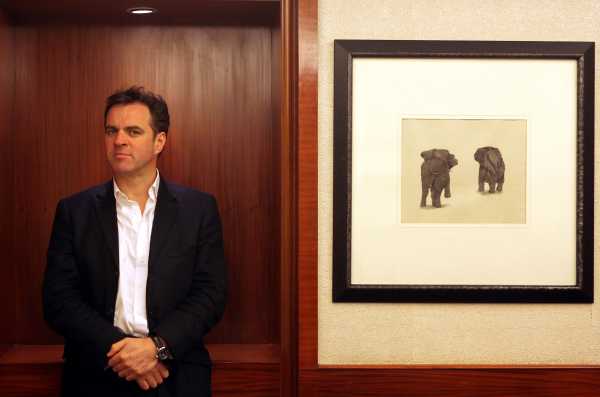
The latest campus free speech controversy has a twist: It involves a conservative professor conspiring with students, in emails that sound like they were written by comic book villains, to dig up dirt on a progressive undergraduate.
The controversy took place at Stanford University and involves Niall Ferguson, a controversial historian known for his defenses of British colonialism. Ferguson was one of the faculty leaders of Cardinal Conversations, a Stanford program run by the conservative Hoover Institution that aims to bring speakers to the university who would “air contested issues on our campus.” The program’s speaker slate leaned right; recent events featured race-and-IQ theorist Charles Murray, tech mogul Peter Thiel, and Christina Hoff Sommers, a prominent critic of modern feminism.
Ferguson seemed to view Michael Ocon, a left-wing student activist slated to graduate in 2020, as a threat to the program. In an email to two members of the Stanford Republicans, John Rice-Cameron and Max Minshull, he wrote that “some opposition research on Mr. O [Ferguson’s name for Ocon] might also be worthwhile.” Minshull, who works as Ferguson’s research associate, said he’d “get on” the dirt-digging.
Some of the emails had an overtly sinister tone. Rice-Cameron, who is, oddly enough, the son of Obama National Security Adviser Susan Rice, wrote in one email that “slowly, we will continue to crush the Left’s will to resist, as they will crack under pressure.”
Ferguson wrote in another note, “now we turn to the more subtle game of grinding them down on the committee,” adding that “the price of liberty is eternal vigilance.”
The emails became public in a May 31 story in the Stanford Daily, the student newspaper, seemingly as a result of someone accidentally forwarding them to the wrong person. Given that it’s wildly inappropriate for professors to be snooping on undergraduates in an attempt to intimidate them politically, Ferguson has been forced to resign from his post running the Cardinal Conversations initiative (but he remains a senior fellow at Hoover).
The whole saga is deeply strange — and revealing. It illustrates a profound double game underpinning much of the so-called “free speech” controversy: a controversy that often isn’t really about freedom and is more concerned with power than with speech.
What the Ferguson incident reveals
Free speech, nominally, shouldn’t be either a right or left issue. A world in which all viewpoints can be respected should, in theory, benefit people from all perspectives.
In practice, many campus conservatives have hijacked the idea. The strategy is to invite someone with a history of making sexist or racist comments, like provocateur Milo Yiannopoulos, with the express purpose of outraging campus liberals. When left-wing students protest, the right claims the mantle of defending free speech — when what they’re actually doing is opening the door to overtly offensive discourse.
It’s a kind of power game. The goal isn’t to vindicate the abstract right to free speech but to assert the right’s power and influence over campus discourse — to force the campus mainstream into a choice between allowing vile ideas to spread or looking hostile to free speech.
The Ferguson emails are an unusually clear admission that this is what’s going on. Digging up dirt on a student in an attempt to silence their activism isn’t about “free speech” — it’s about suppressing left-wing speech. The entire framing of the Cardinal Conversations in the emails positions the initiative, which Ferguson ran, as part of a broader war on “the Left” and “SJWs.”
In an email sent the day after Charles Murray’s Cardinal Conversation, Rice-Cameron calls “last night’s event” (presumably the Murray appearance) “a clear victory,” as “the event was not disrupted and leftists [sic] agitators were constrained to a small absurd demonstration outside.” Ferguson responded by saying that he agrees “100%” and that the event was a “famous victory.”
It’s not like Stanford is a university where there’s no room for right-leaning students. Hoover is a center-right think tank based at the university with a budget of more than $50 million and an endowment of more than $450 million. There is no left-wing equivalent — a large ideological think tank that closely connected to a university — at any school in the United States.
Yet campus conservatives are treating its events not as a well-established place for airing their views, but as part of a campaign to crush liberal opponents. The very decision to invite people like Murray and Hoff Sommers, who are most famous for making inflammatory claims about race and gender (respectively), suggests that the Cardinal Conversations themselves were designed to court controversy.
Ferguson told me in an emailed statement that he does “regret having written” the emails, and that they were motivated by his concern that “the Cardinal Conversations student steering committee was in danger of being taken over by elements that were fundamentally hostile to free speech.” But the text of the emails and his track record of controversial statements — such as attacking the work of liberal economic giant John Maynard Keynes on grounds that Keynes was gay — suggests that’s only part of the story.
There are some very sincere advocates for free speech rights on the right, especially in the national press. But staged campus provocations aren’t really about that. Ferguson’s greatest sin was telling the truth.
Sourse: vox.com






